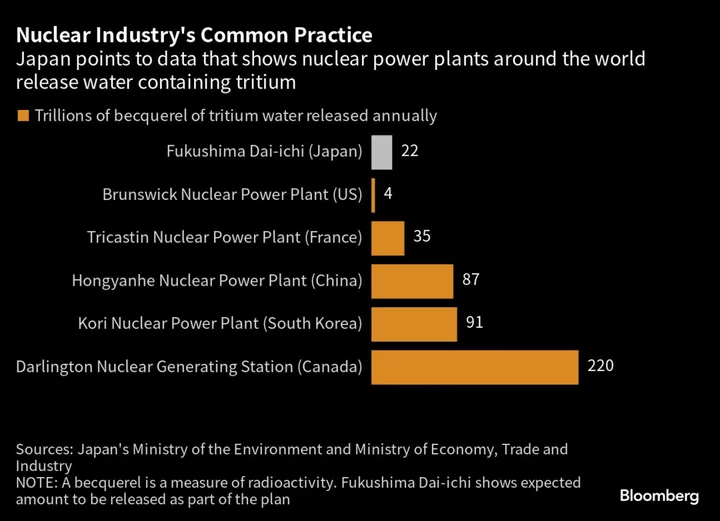A South Korean government panel backed Japan’s plans to release treated wastewater from the Fukushima nuclear disaster site, a move that could ease tension with Tokyo yet stoke public concern.
The team of experts, which sent a delegation to Japan in late May for an inspection, said in a report released Friday that the discharge would meet international standards if it is carried out as planned.
The findings came after United Nations’ atomic watchdog completed a two-year review and said this week the planned released is in line with global safety standards.
The plan for Tokyo Electric Power Co. to release the wastewater — equivalent in volume to about 500 Olympic-size swimming pools — has drawn fierce criticism from China and stirred concerns among Japan’s neighbors who are skittish about matters related to Fukushima, the site of the worst nuclear power disaster in Asia in 2011.
Other countries with operational nuclear plants already safely discharge similar diluted waste offshore, according to the IAEA. South Korean President Yoon Suk Yeol is looking to bolster South Korea’s nuclear energy sector to accelerate the nation’s goal to zero out emission.
Since taking office a little over a year, Yoon has worked to repair ties with Japan, arguing that improved security and economic relations are in the interests of both countries.
Bang Moon-kyu, minister of the office for government policy coordination, said in a briefing Friday as the water is diluted by the Pacific and moves along currents, the impact of any radioactivity is “predicted to be not scientifically significant,” and far less than the average concentration in domestic waters.
South Korea’s progressive opposition has attacked Yoon over the water release, saying it threatens the health and safety of the people. A survey by Japan’s Yomiuri newspaper and South Korea’s Hankook Ilbo conducted in May found 84% of respondents opposed the discharge.
Demand for sea salt in South Korea has rocketed as consumers stockpile the condiment amid worries the release of wastewater could taint future supplies.
Yoon has so far suffered little political damage from the issue. His support rate climbed 2 percentage points to 38% in a weekly Gallup Korea tracking poll released Friday.
China repeated its opposition to Japan’s plans on Friday, saying that it has raised food-safety issues among that nation’s consumers. Customs officials in Beijing said in a statement it would take all necessary measures to guarantee food was safe.
The liquid is now stored in about 1,000 tanks. Tepco, which operates the Fukushima Dai-ichi plant, plans to further dilute the waste with seawater before releasing it off the coast through an underground tunnel.
Japan’s government and Tepco say that removing the wastewater and storage tanks is necessary to allow full decommissioning of the plant.
--With assistance from Shinhye Kang, Sangmi Cha and Shoko Oda.

